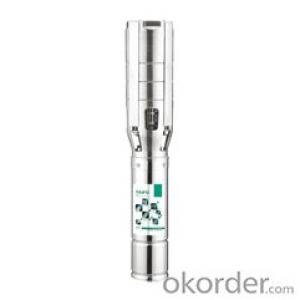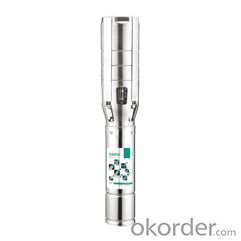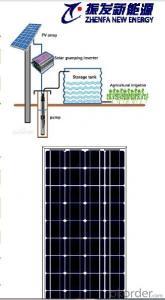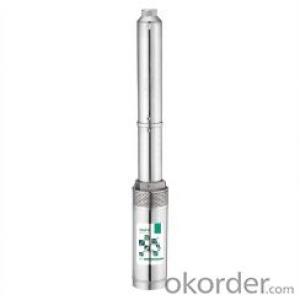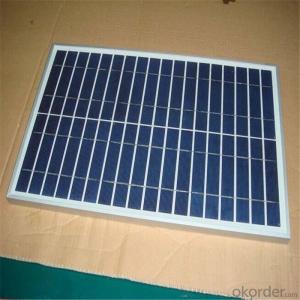Jintai Solar Pump 5tsc Stainless Steel CE Solar Panel
- Loading Port:
- Shanghai
- Payment Terms:
- TT OR LC
- Min Order Qty:
- 50 pc
- Supply Capability:
- 100000 pc/month
OKorder Service Pledge
OKorder Financial Service
You Might Also Like
1.APPLICATION AREA:This project products are mainly used in dry region for irrigation of agriculture, It can be used for drinking water and
living water. The living condition could be much improved. It also can be used for fountains.2.MATERIAL OF PARTS:Outlet: stainless steel
Pump body: stainless steel
Motor body: stainless steel
Bearing: C&U
3.ADVANCED TECHNOLOGY:1.Application innovation
Compared with the traditional alternating current machine, the efficiency is improved 25% by the permanent magnetism, direct current, brushless, non-sensor motor.
2.Technics innovation
Adopt double plastic package for rotor and stator, motor insulation≥300MΩ, the motor security was much improved.
3.Structure innovation
Oil filling, convenient installation and environmental protection4.HIGHLIGHTSa.Energy-saving and environment-protected green products
b.High technique products adopting MPPT and DSP chip technique.
c.100% copper wire, cold-rolled silicon steel sheet
d.CE certificate
e.Advanced three phase brushless DC motor
f.Stainless steel 316 screws
g.3 years warranty5.PRINCIPLE OF OPERATION:Solar panel collects sunlight→DC electricity energy → solar controller(rectification,stabilization,amplification,filtering)→available DC electricity→(charge the batteries)→pumping water6.ADVANTAGES OF SOLAR PUMP SYSTEM:A.It is easier and more widely used than any other dynamoelectric driven pumps.
B.It is more economical and more environmentally friendly.7.MODEL SELECTION:a.The power of solar panel = power of pump ×1.3
The voltage of solar panel = the voltage of pump
The controller should be matched
b.Select the batteries according to the following formulas:
The use hour of battery =
The battery capacity ÷(the machine power÷the battery voltage)×0.6 For example,the machine power is 200W, the battery
capacity is 100AH,the voltage is 12V,and the battery is fully charged,then the use hour is:100÷(200÷12)×0.6=3.6hours
c.The battery capacity=
the use hour ÷0.6×(the machine power÷the battery voltage) For example,the machine power is 200W,the battery voltage
is 12V,and the battery need to be used for 3.6hours,then the battery capacity is:3.6÷0.6×(200÷12)=100AH

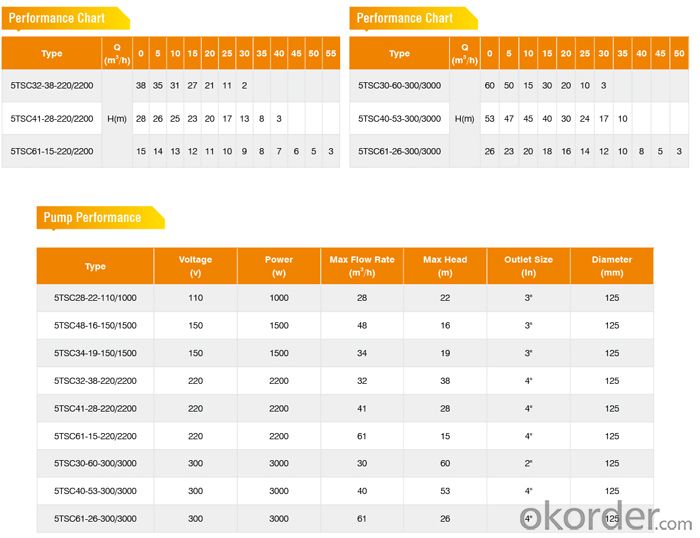
- Q: Can a solar pump be used in areas with high levels of sand in the water?
- Yes, a solar pump can be used in areas with high levels of sand in the water. However, it is important to note that sand and other solid particles can cause clogging and damage to the pump if not properly filtered. Therefore, integrating appropriate filtration systems, such as sand filters or mesh screens, is crucial to prevent any potential issues and ensure the efficient operation of the solar pump in such areas.
- Q: Does a solar pump require a battery backup?
- No, a solar pump does not require a battery backup. It operates directly from the energy generated by sunlight, eliminating the need for batteries to store power.
- Q: How does a solar pump handle water source depletion or drought conditions?
- A solar pump does not have the ability to handle water source depletion or drought conditions on its own. However, certain measures can be taken to mitigate the impact of these conditions. For example, the pump can be connected to a water storage tank or reservoir, allowing excess water to be stored during periods of abundance and used during times of scarcity. Additionally, implementing efficient water management practices such as drip irrigation or rainwater harvesting can help conserve and optimize the use of water resources.
- Q: How does a solar pump handle water with high levels of hydrogen sulfide or other gases?
- A solar pump can handle water with high levels of hydrogen sulfide or other gases by utilizing a gas separation mechanism. This mechanism separates the gases from the water before it is pumped, ensuring that only clean water is supplied.
- Q: Can a solar pump be used for water supply in remote research stations or observatories?
- Yes, a solar pump can be used for water supply in remote research stations or observatories. Solar pumps are an ideal solution for such locations as they utilize solar energy to pump water without the need for grid electricity. This makes them reliable and cost-effective options for ensuring a continuous water supply in remote areas where traditional power sources may be limited or unavailable.
- Q: Can a solar pump be used in areas with high levels of sulfates in the water?
- Yes, a solar pump can be used in areas with high levels of sulfates in the water. Solar pumps are typically designed to handle various water conditions, including those with high mineral content such as sulfates. However, it is important to select a solar pump with appropriate filtration systems or pre-treatment options to mitigate the potential adverse effects of sulfates on the pump's performance and longevity.
- Q: Can solar pumps be used in remote areas without access to the power grid?
- Yes, solar pumps can be used in remote areas without access to the power grid. Solar pumps are designed to operate using solar energy, which makes them ideal for remote locations where there is no access to electricity. By harnessing the power of the sun, these pumps can provide a reliable source of water for various purposes such as irrigation, drinking water, and livestock. They are cost-effective, sustainable, and do not require any connection to the power grid, making them a practical solution for remote areas.
- Q: Can a solar pump be used in conjunction with a water storage reservoir?
- Yes, a solar pump can be used in conjunction with a water storage reservoir. The solar pump can be used to extract water from the reservoir and provide a reliable and sustainable source of water for various applications such as irrigation, livestock watering, or even household use. The solar pump's operation is powered by solar energy, making it a cost-effective and environmentally friendly solution for accessing water from a storage reservoir.
- Q: How does a solar pump handle water source contamination from nuclear power plants?
- A solar pump does not directly handle water source contamination from nuclear power plants. However, it can be used as an alternative power source for water treatment systems that are designed to remove contaminants, including those present in water sources affected by nuclear power plant operations.
- Q: Can a solar pump be used in areas with high salinity water?
- Yes, a solar pump can be used in areas with high salinity water. Solar pumps are often equipped with a reverse osmosis (RO) system or other filtration mechanisms that can effectively remove salts and impurities from the water, making it suitable for various applications such as irrigation, livestock watering, and drinking water supply.
Send your message to us
Jintai Solar Pump 5tsc Stainless Steel CE Solar Panel
- Loading Port:
- Shanghai
- Payment Terms:
- TT OR LC
- Min Order Qty:
- 50 pc
- Supply Capability:
- 100000 pc/month
OKorder Service Pledge
OKorder Financial Service
Similar products
Hot products
Hot Searches
Related keywords
